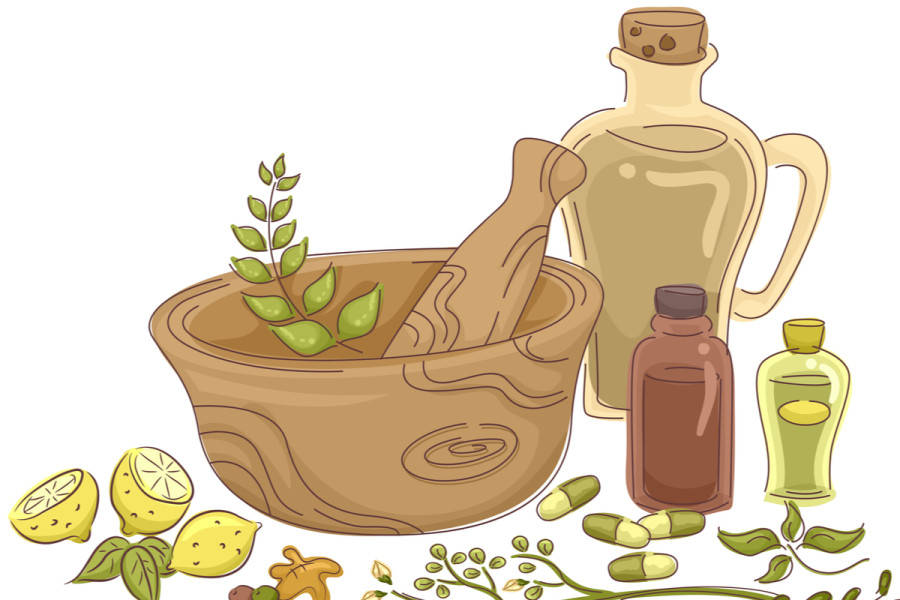Columns
Self-medication can be harmful
There have been no proven herbal medications that help treat coronavirus.
Yunima Sapkota
A few days ago, I got a call from a friend asking if he could get some advice about Covid-19. He said his test came back positive. He had no symptoms but took a medicine combo that an Internet article had suggested for preventing coronavirus deaths. On further inquiry, I realised that he was consuming some antibiotics, antiviral herbs, vitamins and so on. I asked him to stop those medications and visit a doctor if he developed any symptoms. This incident made me question the self-medication practice patients are engaging in at the moment.
The World Health Organisation (WHO) defines self-medication as the use of drugs as intermittent or continued consumption for self-diagnosed disorders, chronic or recurrent diseases and symptoms. The pandemic has created serious concern among the public regarding the disease and its treatment. To date, there isn’t any proven treatment for Covid-19. In such a scenario, possible therapeutic options are being used by medical professionals based on their clinical judgment and research done all over the world.
Some people rely on medicinal plants and herbs for Covid -19 prevention and believe that they will protect them from getting infected and having a life-threatening disease. The idea behind using herbal remedies for Covid -19 is not bad in itself, and there could be some medicines that are helpful against the infection and disease. After all, a lot of medicines that we use today were initially extracted from plants. If we consider that, some herbs could be helpful against the disease and finding that could help end the pandemic.
At the same time, we also need to look at the haphazard use of herbal remedies. For example, salicylic acid in the Spiraea genus of shrubs was extracted to make aspirin, a drug used for several diseases. This does not mean that it can be used for any condition. It is also associated with a lot of side effects. When a person is prescribed aspirin, the doctor has to consider the disease the patient is suffering from and any harm that may occur, and then prescribe it or opt for some other medication.
Herbal medications
Similarly, a herb that made me feel better when I caught a cold last year or had diarrhoea a few years back does not necessarily help me against Covid-19 and could potentially cause more harm than good. Currently, there have been no proven herbal medications that help treat coronavirus. Many studies are being done to look for some herbal remedies, but encouraging results are not yet available. Consuming a plant may seem harmless, but it can result in deleterious effects, especially when no one knows what it does to the body. Excessive use of some herbal remedies makes the problem worse, and it has made people so sick that they had to be hospitalised during the pandemic owing to the toxic effects of the remedy itself.
Some other people copy the prescription written for a specific patient and pass it on to others with different exposure and disease history. This was very popular, especially during the first wave. Some local authorities allegedly made a list of medicines everyone had to consume when isolated, including antibiotics. Two people infected with the virus could have different outcomes. One may not even notice the infection and the other could become so sick that they have to be hospitalised and administered supplemental oxygen and medications through their veins. Should the first person get medication through their veins because the second person got the same? Of course, not.
Drug reactions
The use of Vitamin C, Vitamin D, and zinc has increased significantly from last year in the belief that these medications prevent infection while there is no proven data to date. The use of paracetamol for self-diagnosed fever is justified and is also recommended by the WHO, but the use of prescription medicines like antibiotics, hydroxychloroquine and steroids should be based only on the prescription of a medical doctor. These medicines do not have any preventive role in Covid-19 and can lead to adverse drug reactions if misused.
Previous research has found dexamethasone helpful in treating severe Covid-19, but researchers have suggested its use only in patients with hypoxia. It is not recommended to be self-used in mild to moderate cases due to its inherent safety problems. Staying updated on the treatment of diseases is certainly good, but relying on self-judgment to treat illnesses can lead to complications, so one should always seek medical advice on the treatment of Covid-19.
In Nepal, although the sale and distribution of narcotics and psychotropic substances require a prescription; other drugs including antibiotics are purchasable without a prescription. This has led to the irrational use of antibiotics, a major cause of antimicrobial resistance. Strict regulation on prescription drugs is a necessity. Health facilities, especially consultation with healthcare professionals, should be made easier to discourage self-medication.
The media should be encouraged to inform the public about the rational use of prescription medicines and the safety concerns they are used irrationally. The government should monitor false or misleading advertisements that encourage self-medication. The people themselves should be more responsible while sharing information on social media. Let’s unite and fight this pandemic by avoiding self-medication practices.




 9.7°C Kathmandu
9.7°C Kathmandu















